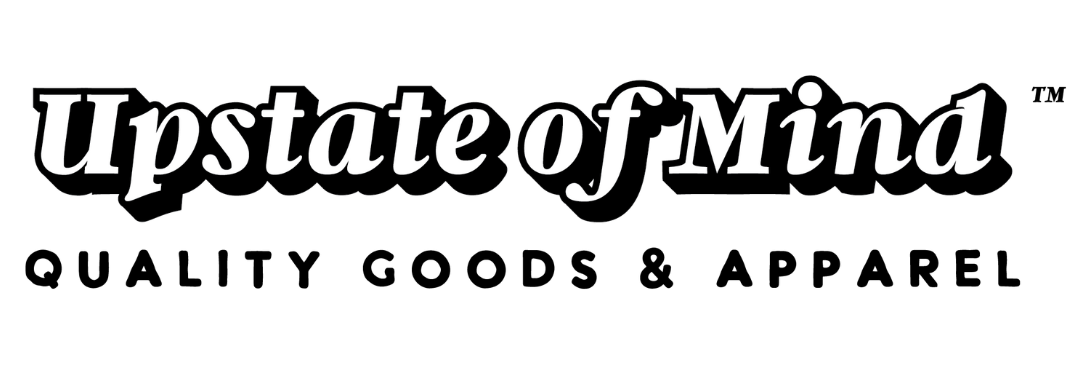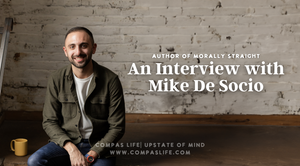
Meet Mike De Socio (He/Him), an Upstate local, author of Morally Straight, and award-winning, independent journalist who specializes in stories about the LGBTQ+ community. Mike's well-rounded career encompasses photography, writing, reporting, and editing, with his contributions that have been featured in publications such as The Washington Post, Bloomberg, and The Guardian. Based in Troy, NY, he often explores the scenic landscapes of Upstate New York by foot or bike, whether wandering the Adirondack mountains or navigating the charming streets of Troy!
We had the utmost honor in interviewing Mike De Socio and learning more about his story, as well as his new upcoming book, Morally Straight.

What initially drew you to journalism, and how has your passion for storytelling evolved over the years?
I’ve wanted to be a journalist ever since I joined my high school newspaper at the strong suggestion of my older brother. I started as a photographer–my clever way of joining the paper without having to write (something I did not enjoy doing at the time). I carried that passion into college, where I studied photojournalism. But along the way I fell in love with writing, too, because I felt like it allowed me access to stories I couldn’t always figure out how to tell visually. Eventually, the writing took over. I’m now primarily a writer, and produce freelance journalism for national and local publications alike.
What do you love most about living in Troy, NY, and how has the community shaped your life and career?
I never expected Troy to be a home for me. I ended up here for work, and decided to stick around even after that first job was in my rear view mirror. I love Troy’s walkability and its neighborhood feel. There’s something so lovely about our city; it’s small but mighty.
Living here has shaped my life in so many ways. I discovered a love for hiking in the Adirondacks (I’m a 46er), and a love for cycling after I gave up my car and decided to live in Troy car-free. This city, with its comparably low cost of living, also allowed me to launch my career in freelance journalism.
As someone who enjoys spending their free time hiking in the Adirondacks and exploring the outdoors by bike, what are your favorite trails or places that you like to travel to?
My favorite Adirondack high peak is Big Slide. It’s the best bang for your buck: Amazing views and definitely not one of the hardest peaks. On my bike, I love taking the Mohawk-Hudson Trail from Troy to Schenectady and grabbing lunch at Arthur's in the Stockade.

You've been recognized with awards from organizations like the Boston Press Photographers Association and the Society of Professional Journalists! Can you share a particularly memorable moment or project that stands out to you?
When I was a senior in college, I spent 6 months reporting a magazine piece about LGBTQ+ youth homelessness in Boston—something that was and is still a huge problem. That project was the most ambitious piece of journalism I had done at the time, and taught me so much about how to do in-depth reporting and writing.
As both an award-winning freelance journalist and an Eagle Scout deeply involved in the Boy Scouts of America, what inspired you to write your new book Morally Straight?
From the moment I learned about the history of gay exclusion in the Scouts, I’ve been fascinated by it. How did we get here? Why was there ever a policy banning gay Scouts? These were the questions I wanted answers to. I also realized that, despite the gay membership debate often attracting national media attention, no one had ever taken a step back to tell a full narrative history. And as a queer journalist and Eagle Scout, I figured I was the perfect person to do it.
Being a former scout, how did your personal experiences shape the way you approached researching and writing this book?
I approached this book with a deep sense of why the Boy Scouts of America still matters, and how important it is in the lives of kids. Many journalists are quick to dismiss or disparage the BSA on the grounds of their (many) failures, but I understood based on my personal experience why the organization still held an important place in society. So while the book is not afraid to be critical of the BSA when warranted, it has a foundational empathy for the program and its members.

Can you share a bit about your experience as an Eagle Scout and how it has shaped your perspective on leadership, community involvement, and personal growth?
My experience in Scouting really shaped so much of how I see the world. I don’t think I had any concept of leadership until I joined the program. The ranks themselves taught me the nuts and bolts of leadership, but my experience writing about LGBTQ+ inclusion in the program really pushed me to embody that leadership, bravery and commitment to community in deeper ways.
In Morally Straight, you highlight individuals like James Dale, Steven Cozza, Jennifer Tyrrell, and Zach Wahls, who were pivotal activists in the fight for LGBTQ+ inclusion within the Boy Scouts of America. What actions or attributes were most inspiring about them?
It was an honor for me to be able to get to know these inspiring individuals through the reporting of the book.
What’s true of each of the people you named is that they used what they learned in Scouting–their sense of morality and leadership–as the basis for their activism. These were not outsiders looking to attack Scouting. They were some of Scouting’s most accomplished members, who encountered a policy of discrimination and called on the organization to live up to its own values. That’s inspiring to me.
Morally Straight spans over twenty-five years, capturing a period of significant social and cultural shifts regarding LGBTQ+ rights. What lessons can be drawn from the organization's journey towards greater inclusivity?
There are two key lessons from the history of LGBTQ+ activism in the organization.
The first is that storytelling was a powerful force for change. The personal stories of people like James Dale and Jennifer Tyrrell are what forced Americans to understand the policy of discrimination and understand the tangible harm it was causing in people’s lives. A policy is abstract, but a person and their story are not.
The second lesson is that insider pressure is really effective in these types of campaigns. Again, almost all of the key activists here were themselves Scouters (and often Eagle Scouts). It’s one thing for the BSA to ignore outsiders, but it was harder for them to ignore their own members when they were calling for change.

Beyond the publication of your book, what do you hope will be the lasting impact of Morally Straight on discussions surrounding LGBTQ+ rights, youth activism, and the future of organizations like the Boy Scouts of America?
I hope this book can create a lasting impact in the current-day and future movements for LGBTQ+ rights. We are living through a moment when the rights of queer and trans people especially are under attack. The people I write about in my book faced many of the same challenges in their battles for equality, and I hope today’s activists can find lessons and inspiration from them.
What aspect of your book's release excites you the most?
I can’t wait to go on my book tour and meet readers. I dedicated the book to queer Scouts, so I hope this book finds them, and I hope I get to meet them and thank them for reading.
What advice would you give to aspiring freelance journalists looking to establish themselves in the industry?
Being a freelancer means being adaptable. Be open-minded about the mix of work that will make you happy and pay the bills.
When and where can people meet you during your book tour?
I’ll be criss-crossing the country throughout the summer! But local folks can find me on June 4th from 4-5 p.m. at Market Block Books in downtown Troy.
Book Tour Dates
June 4: Troy, NY — Market Block Books — 4 p.m.
June 6: Providence, RI — Symposium Books — 6 p.m. With Nick Andersen
June 10: Washington, D.C. — Politics & Prose (Conn. Ave.) — 7 p.m. With Sonia Rao
June 12: Philadelphia, PA — Giovanni’s Room — 6 p.m. With Felicia Gans Sobey
June 22: Asbury Park, NJ — Asbury Book Cooperative — 7 p.m. With Kerri Sullivan
June 27: Boston, MA — Beacon Hill Books & Cafe — 6 p.m. With Mitchell Zuckoff
July 10: Chicago, IL — Gerber/Hart Library and Archives — 7 p.m. With Cate Readling & Mary Anderson
July 11: Oak Park, IL — First United Church of Oak Park — 6 p.m. With Cate Readling & Mary Anderson
July 31: Boulder, CO — Boulder Bookstore — 6:30 p.m. With Sam Aronson
(Plus more dates coming soon!)
And lastly, what is your idea of the ideal Upstate of Mind? What does Upstate of Mind mean to you?
To me, the Upstate of Mind is about blazing your own path. Living in a small city like Troy for most of my twenties was not something I expected–or that most of my peers were doing. But I found so much joy and adventure here when I was willing to think outside the box.
LOVE UPSTATE? CHECK OUT ALL OUR UPSTATE OF MIND APPAREL AND GOODS! COMPASLIFE.COM
UPSTATE OF MIND™ IS A REGISTERED TRADEMARK OF COMPAS LIFE™






